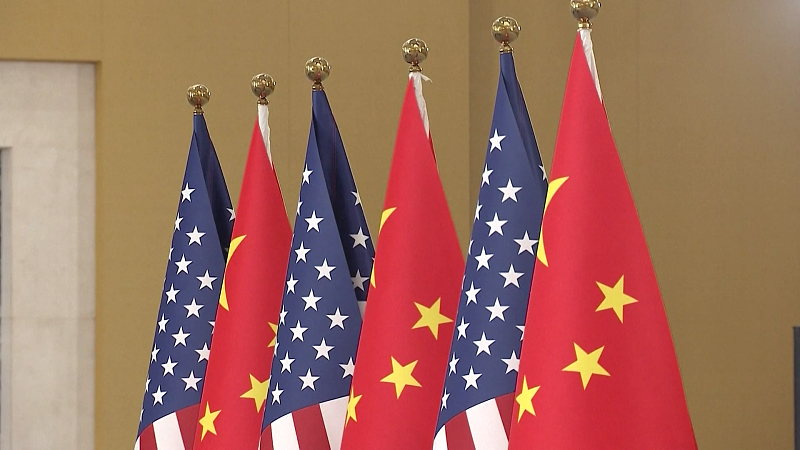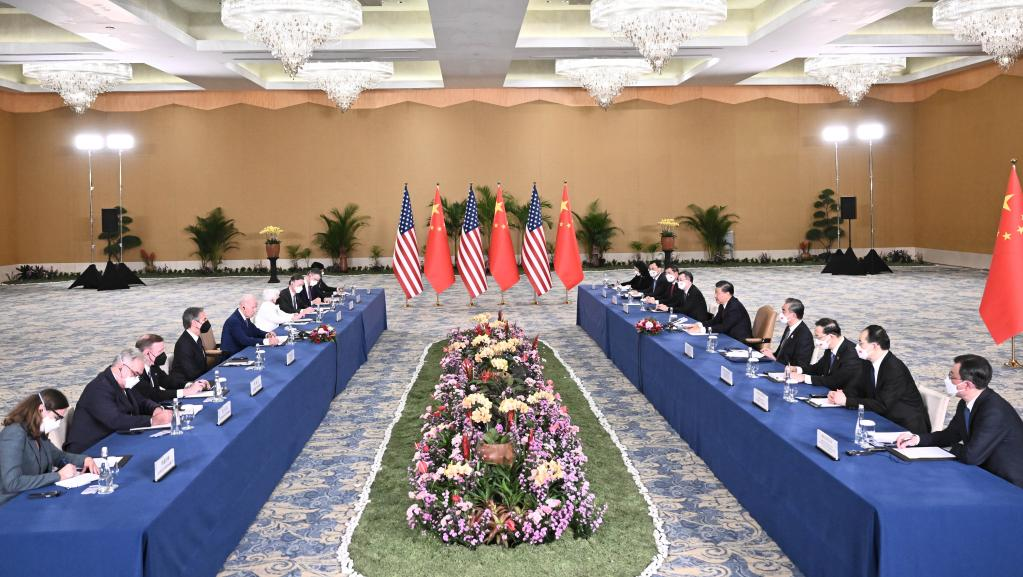
Editor's note: Keith Lamb is a University of Oxford graduate with a Master of Science in Contemporary Chinese Studies. His primary research interests are China's international relations and "socialism with Chinese characteristics." The article reflects the author's opinions and not necessarily the views of CGTN.
The meeting between Chinese President Xi Jinping and U.S. President Joe Biden on the sidelines of the G20 summit in Bali, comes as a welcome relaxation of tensions in what has been dubbed a new Cold War between the U.S. and China. While both leaders made positive remarks, their positive words, especially when it comes to the U.S. side, must be followed by positive actions.
Recognizing that Sino-U.S. relations "stands at a crossroads," Xi said that he seeks "to put China-U.S. relationship on the right course and bring it back to the track of healthy and stable growth." Confrontation is not in the U.S.'s, China's or the world's interest. Dividing the world into two Cold War blocs would hinder humanity's shared future. One only needs to look at the pandemic and the Ukraine conflict to realize how detrimental a world cut off from each other would be. At worst, conflict leading to nuclear war would end civilization.
With this in mind, no wonder, Xi, in his opening comments said that "currently, the state of China-U.S. relations is not in the fundamental interests of our two countries and peoples. It's not what the international community expects from us either." Simply put, conflict will lead to the ruin of all while cooperation will bring peace and development.
Biden speaking to reporters at the talk said "I absolutely believe there need not be a new Cold War" with China. Considering the events of the past few years, this is a big statement. However, this statement must be backed up by actions and a recognition that recent U.S. actions are precisely that of a power that seeks confrontation.
For example, for the sake of maintaining U.S. hegemony, China has repeatedly been labeled "a peer competitor" to be dealt with. In order to ferment ill feeling, U.S.-funded forces have falsely designated China as "guilty of forced labor in Xinjiang." When it comes to China's Taiwan region, the U.S. has been interfering with China's domestic affairs of the reunification of its territory. Then, the U.S. by denying China's access to advanced technologies seeks to subjugate China's development.
The attitude of wishing to subjugate China or the rest of the Global South to the will of a hegemonic actor is unjust. However, this is exactly what is meant when the U.S. declares that will not allow any peer competitor and seeks full spectrum dominance. Sino-U.S. relations are important to the rest of the Global South because their relationship will also be a model for all other rising powers which are working for economic equality through public goods like the Belt and Road Initiative.

Chinese President Xi Jinping meets with U.S. President Joe Biden in Bali, Indonesia, November 14, 2022. /Xinhua
Chinese President Xi Jinping meets with U.S. President Joe Biden in Bali, Indonesia, November 14, 2022. /Xinhua
Consequently, the hegemonic mentality must be dropped because the fruits of this mentality can only be conflict. It is true that as China rises it will supplant the U.S. as the largest economy but this doesn't mean the U.S. economy will shrink. Instead, it will share a smaller portion of a much bigger pie. This will become the norm for both the U.S. and China too as the rest of the Global South develops.
In terms of economic growth, China already has the correct attitude. It has proven that it is ready to bring development to all. The U.S. can take on this win-win mentality and feel proud of its achievements in bringing about global development through free trade and technological innovation which it can continue to profit from.
Xi remarked that a "statesman should also think about and know how to get along with other countries and the wider world." Avoiding a Cold War means refraining from smearing and demonizing the other sides. Raising claims such as "Uygur human rights," especially considering that China through its poverty alleviations successes stands as the greatest promoter of human rights, is misguided.
History is the best textbook. Looking back at previous U.S. conflicts such as in Iraq, which were sparked by smears of weapons of mass destruction, Beijing understandably must feel defensive when it too is smeared. This is especially the case considering the ambiguity the U.S. displays towards the Taiwan question.
When it comes to the Taiwan question, the U.S. must understand that this issue is a non-negotiable red line for Beijing that if pushed can only lead to the logical conclusion of a hot war. Biden has said on many occasions that the United States does not support "Taiwan independence" and has no intention to use Taiwan as a tool to seek advantages in competition with China or to contain China. If this is the case, then the U.S. must refrain from conducting state-to-state like relations with China's Taiwan region.
In actual fact, Biden's wishes for a peaceful resolution are reflected by Beijing which seeks peaceful reunification and insists on the "One Country, Two Systems" principle.
Biden commented that he believed Beijing was not planning to use immanent force to seek reunification. Biden is right, but to ensure that this will always be the case means that the U.S. needs to respect China's sovereignty as not doing so fuels tensions.
(If you want to contribute and have specific expertise, please contact us at opinions@cgtn.com. Follow @thouse_opinions on Twitter to discover the latest commentaries in the CGTN Opinion Section.)